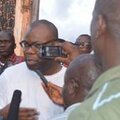 For the first time in Liberia a news outlet has built up enough credibility and trust that Liberians were willing to rise up to defend it.
For the first time in Liberia a news outlet has built up enough credibility and trust that Liberians were willing to rise up to defend it.
Perhaps I’ll be able to laugh one day when I look back at my time in a Liberian jail cell these last few months. In some ways it was comical. In a jail filled with murderers, coup plotters, thieves and rapists, I, a humble newspaper editor, had the longest sentence of any of them.
Much longer. Unable to pay the $1.5m libel verdict imposed on me and my newspaper FrontPage Africa, I was to serve a term the courts deemed equivalent to that astronomical sum – 5000 years. My jail term was 100 times longer than that of the worst criminal there.
That figure is significant. As the editor and publisher of the newspaper that has exposed countless corrupt officials including several of the highest members of government, led to the cancellation of fraudulent concession agreements and the withdrawal of corrupt presidential appointments, I am seen by some in government as threat one hundred times greater than even a man caught plotting a coup.
That I am free today, writing this in my office with the comforting sound of our printing press rolling for the first time in three months in the room next door, is entirely due to the uproar my jailing provoked among readers in Liberia and the diaspora. Had it not been for their anger, and the pressure brought on President Ellen Johnson Sirleaf by journalism and rights activists in the international community, I may well have spent the rest of my days in jail.
We had that support because we have earned it. Our victory reflects a critical shift: for the first time in Liberia a news outlet has built up enough credibility and trust that Liberians were willing to rise up to defend us. Free press opponents – corrupt government officials and public figures that we’ve exposed – thought they could use this libel suit to shut us down or cower us as they have done to others. Controlling media with the threat of bogus libel suits has been the modus operandi of the government led by our Nobel laureate president. Several media outlets before us have been shut down or cowered by astronomical libel suits. Despotic leaders elsewhere in Africa attack the press directly. In Liberia, government uses libel suits to intimidate media at home while at the same time garnering international praise for the president’s showy commitments to press freedom while she is abroad.
But this time was different. During three painful months of legal wrangling President Johnson Sirleaf faced protests at home and criticism in global newspapers and public forums abroad including during her August visit to Canada. Behind the scenes diplomats from major donor countries demanded a resolution. Potential foreign investors got nervous. Johnson Sirleaf told a meeting of activists in New York that my jailing threatened to “undo everything we have done in seven years in office”. Finally, under heavy pressure from the president, a deal was struck and the case was withdrawn.
It was a clear win for us and Liberian news media across the board. The plaintiff in the libel suit, a former president at a US university, has been disgraced internationally. He had sued us for reporting the findings of Liberia’s independent corruption watchdog which said he needed responsible for $6m missing funds. Though she quietly dismissed him from government, President Johnson Sirleaf refused to prosecute him, or scores of other government members accused of corruption. Thanks to my jailing, the allegations that were once confined to Liberia are now detailed in the pages of the world’s media. The president claimed that this was a matter between two private citizens but few Liberians believed Toe continued the case without a presidential imprimatur.
In the end the costs for taking us on were too high. It will be a very brave or very stupid government that will take us on again. As long as we continue to serve the public with critical, thorough, brave reporting that holds leaders accountable, Liberians will not let opponents take us down.
Together with our partner New Narratives, the international non-profit that supports much of our reporting, we are proving quality, independent news media is one of the most powerful forces for change in Africa. This is just our latest important victory. Last year the courageous work of one of our reporters Mae Azango, forced the government to take its first decisive stand against female genital cutting. With a series of reports that cost a total of $1000 Mae’s reporting had more impact than millions spent on fighting FGC around the region. Our consistent exposure of corruption has led government members to curb their graft and helped Liberia move up from the bottom of Transparency International’s corruption rankings.
Audiences in the West know news media plays a critical role in arming them with the information they need to demand change and accountability. The same is true in Africa. By supporting African news media you allow us to give Africans the information we can use to drive change ourselves without creating dependency and market inefficiencies like so much of the aid we see here.
Support media development efforts in Africa, buy advertising in our pages and on our air waves and Africans will know what we need to do to move forward.
Rodney Sieh is a the managing editor and publisher of FrontPage Africa newspaper and FrontPageAfricaonline.com
